否定何时不前移
- 格式:doc
- 大小:15.50 KB
- 文档页数:2

否定转移的用法公司内部编号:(GOOD-TMMT-MMUT-UUPTY-UUYY-DTTI-否定转移的用法1) 将think, believe, suppose, expect, fancy, imagine等动词后面宾语从句的否定词转移到主句中,即主句的谓语动词用否定式,而从句的谓语动词用肯定式。
I don”t think I know you. 我想我并不认识你。
I don” t believe he will come. 我相信他不回来。
注意:若谓语动词为hope,宾语从句中的否定词不能转移。
I hope you weren”t ill. 我想你没有生病吧。
2) 将seem, appear 等后的从句的否定转移到前面。
It doesn”t seem that they know where to go.看来他们不知道往哪去。
It doesn”t appear that we”ll have a sunny day tomorrow.看来我们明天不会碰上好天气。
3) 有时将动名词,介词短语或整个从句的否定转变为对谓语动词的否定。
I don”t remember having ever seen such a man.我记得从未见过这样一个人。
(not否定动名词短语 having…)It”s not a place where anyone would expect to see strange characters on the street.在这里,人们不会想到在街上会碰上陌生的人。
(anyone 作主语,从句中的谓语动词不能用否定形式。
)否定转移用法总结kenny128 (2006-03-11 12:52)有感于课文中一句话的理解)山东高唐一中刘长友外研版的新课标英语课本第二册Module 1 “Zhou Kai(2)p2中有这样一句话:I think I don’t get these things because I take a lot of exercise and am very fit.不少有学有基础的学生,其中包括一些老师,对这一个句子中,该不该用否定转移的句子,展开了激烈讨论。
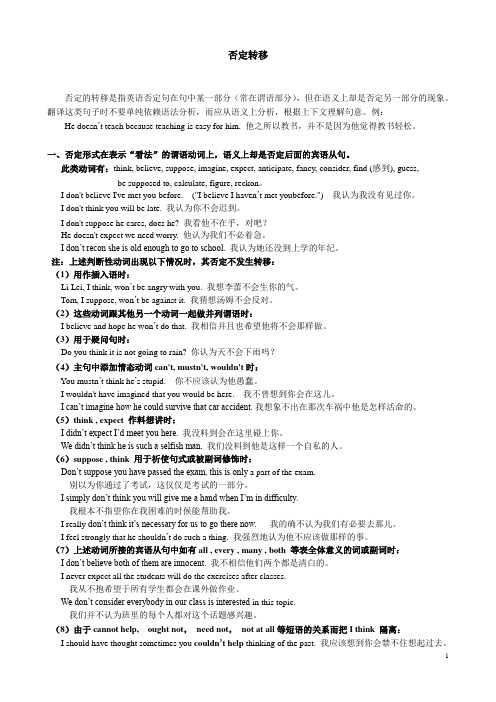
否定转移否定的转移是指英语否定句在句中某一部分(常在谓语部分),但在语义上却是否定另一部分的现象。
翻译这类句子时不要单纯依赖语法分析,而应从语义上分析,根据上下文理解句意。
例:He doesn’t teach because teaching is easy for him. 他之所以教书,并不是因为他觉得教书轻松。
一、否定形式在表示“看法”的谓语动词上,语义上却是否定后面的宾语从句。
此类动词有:think, believe, suppose, imagine, expect, anticipate, fancy, consider, find (感到), guess,be supposed to, calculate, figure, reckon。
- I don't believe I've met you before. ("I believe I haven’t met youbefore.") 我认为我没有见过你。
- I don't think you will be late. 我认为你不会迟到。
- I don't suppose he cares, does he? 我看他不在乎,对吧?- He doesn't expect we need worry. 他认为我们不必着急。
- I don’t recon she is old enough to go to school.我认为她还没到上学的年纪。
注:上述判断性动词出现以下情况时,其否定不发生转移:(1)用作插入语时:- Li Lei, I think, won’t be angry with you. 我想李蕾不会生你的气。
- Tom, I suppose, won’t be against it. 我猜想汤姆不会反对。
(2)这些动词跟其他另一个动词一起做并列谓语时:- I believe and hope he won’t do that. 我相信并且也希望他将不会那样做。
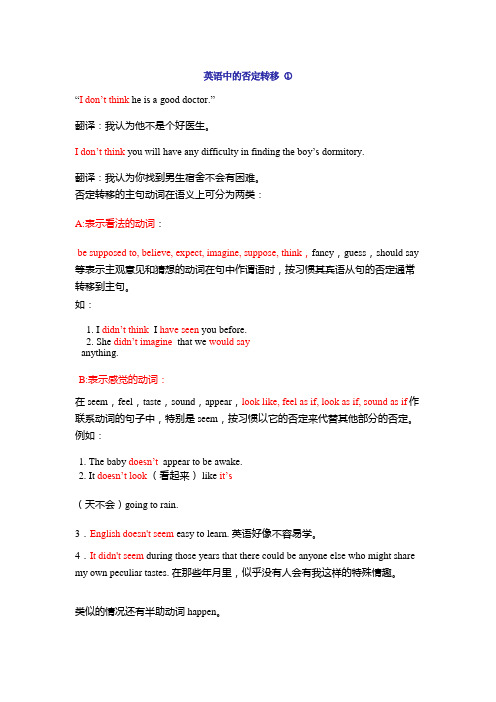
英语中的否定转移○1“I don’t think he is a good doctor.”翻译:我认为他不是个好医生。
I don’t think you will have any difficulty in finding the boy’s dormitory.翻译:我认为你找到男生宿舍不会有困难。
否定转移的主句动词在语义上可分为两类:A:表示看法的动词:be supposed to, believe, expect, imagine, suppose, think,fancy,guess,should say 等表示主观意见和猜想的动词在句中作谓语时,按习惯其宾语从句的否定通常转移到主句。
如:1. I didn’t think I have seen you before.2. She didn’t imagine that we would sayanything.B:表示感觉的动词:在seem,feel,taste,sound,appear,look like, feel as if, look as if, sound as if作联系动词的句子中,特别是seem,按习惯以它的否定来代替其他部分的否定。
例如:1. The baby doesn’t appear to be awake.2. It doesn’t look(看起来) like it’s(天不会)going to rain.3.English doesn't seem easy to learn. 英语好像不容易学。
4.It didn't seem during those years that there could be anyone else who might share my own peculiar tastes. 在那些年月里,似乎没有人会有我这样的特殊情趣。
类似的情况还有半助动词happen。
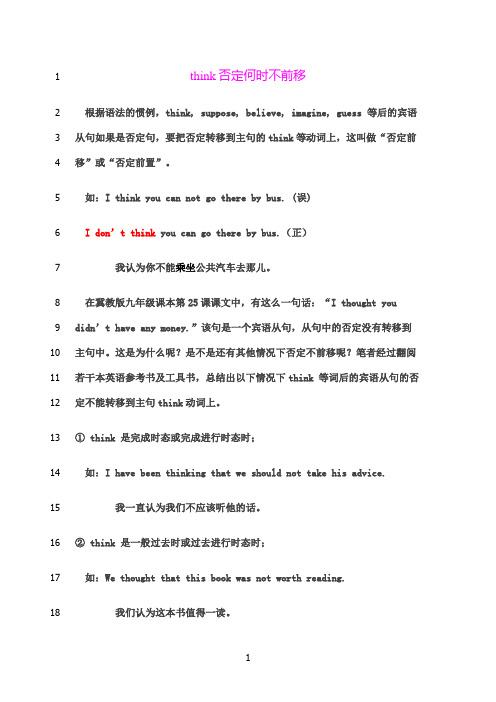
think否定何时不前移1根据语法的惯例,think, suppose, believe, imagine, guess 等后的宾语2从句如果是否定句,要把否定转移到主句的think等动词上,这叫做“否定前3移”或“否定前置”。
4如:I think you can not go there by bus. (误)5I don’t think you can go there by bus.(正)6我认为你不能乘坐公共汽车去那儿。
7在冀教版九年级课本第25课课文中,有这么一句话:“I thought you8d idn’t have any money.”该句是一个宾语从句,从句中的否定没有转移到9主句中。
这是为什么呢?是不是还有其他情况下否定不前移呢?笔者经过翻阅10若干本英语参考书及工具书,总结出以下情况下think 等词后的宾语从句的否11定不能转移到主句think动词上。
12① think 是完成时态或完成进行时态时;13如:I have been thinking that we should not take his advice.14我一直认为我们不应该听他的话。
15② think 是一般过去时或过去进行时态时;16如:We thought that this book was not worth reading.17我们认为这本书值得一读。
18③ think 前有副词修饰的时候;19如:I almost think you are not my son’s teacher.20我差点认为你不是我儿子的老师。
21④ think 前有do, did 等词强调时;22如:I do think that she is not pretty at all.23我确实认为她不漂亮。
24⑤ think 用于一般疑问句或特殊疑问句中;25如:Do you think he will not join the Party?26你认为他不会入党吗?27Why do think we can’t beat you?28你们怎么认为我们打不赢你们呢?29⑥当think后的宾语从句中含有no, never, nothing, nobody等否定词30时;31如:I think she may have nothing to do today.32我认为她今天没事干。
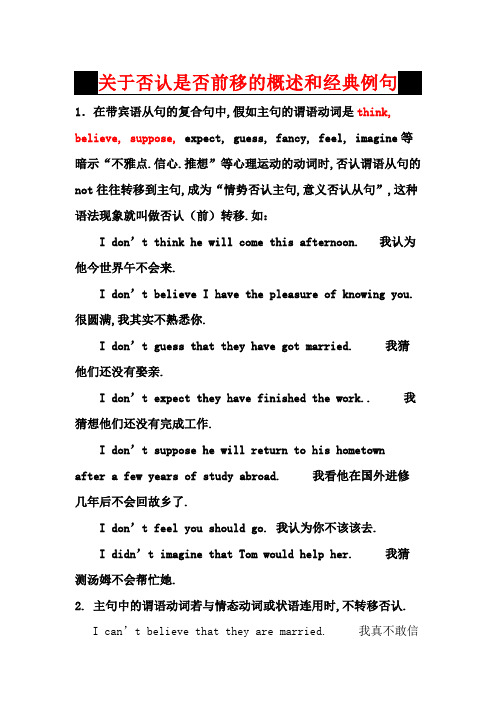
关于否认是否前移的概述和经典例句1.在带宾语从句的复合句中,假如主句的谓语动词是think, believe, suppose, expect, guess, fancy, feel, imagine等暗示“不雅点.信心.推想”等心理运动的动词时,否认谓语从句的not往往转移到主句,成为“情势否认主句,意义否认从句”,这种语法现象就叫做否认(前)转移.如:I don’t think he will come this afternoon. 我认为他今世界午不会来.I don’t beli eve I have the pleasure of knowing you. 很圆满,我其实不熟悉你.I don’t guess that they have got married. 我猜他们还没有娶亲.I don’t expect they have finished the work.. 我猜想他们还没有完成工作.I don’t suppose he will return to his hometownafter a few years of study abroad. 我看他在国外进修几年后不会回故乡了.I don’t feel you should go. 我认为你不该该去.I didn’t imagine that Tom would help her. 我猜测汤姆不会帮忙她.2. 主句中的谓语动词若与情态动词或状语连用时,不转移否认.I can’t believe that they are married. 我真不敢信任他们娶亲了.We can’t believe that he turns an honest penny. 我们不克不及信任他是用合法手腕挣钱. You mustn’t think he’s an honest person. 你不成以认为他是一个说谎的人.I didn’t ever suppose that they were happy. 我其实不认为他们是痛苦的.但是,在带有can’t和couldn’t的句子中,有时can’t和couldn’t带有否认转移的寄义.如:She can’t seem to do it. (=She seems not to be able to do it.) 她似乎不克不及做这件事.留意动词think, believe, suppose, imagine, expect,feel鄙人列情形下,否认不转移:(1) 这些动词跟其他另一个动词一路做并列谓语时,否认不转移.如:I believe and hope he won’t do that. 我信任并且也愿望他将不会那样做.I feel and admit that we are not foolish. 我认为并且也承认我们其实不愚昧.(2)用于疑问句时,否认不转移.如:Do you think it is not going to rain? 你认为天不会下雨吗?Don’t you believe that he has done a good thing? 岂非你不信任他做了一件功德?(3)用作拔出语时,否认不转移.如:Li Lei, I think, won’t be angry with you. 我想李蕾不会生你的气.Tom, I suppose, won’t be against it. 我猜测汤姆不会否决.Mike, I believe, hasn’t seen the film. 我认为迈克没有看这场片子.(4)动词前有其他副词润饰时,否认不转移.如:I really don’t think it’s necessary for us to go there now. 我的确不认为我们有须要去那儿. I feel strongly that he shouldn’t do such a thing. 我强烈地认为他不该该做那样的事. (5) 动词为非一般如今时或主语不是第一人称时,否认不转移.I thought that he wouldn’t come back soon. 我原认为他不会回来得这么快.She didn’t believe that he became a good boy. 她不信任他变成了一个好孩子.He thinks that he isn’t fit for the job. 他认为他不合适这件工作.He doesn’t believe that what we told him is true. 他不信任我们告知他的事是真的.(6) 当宾语从句中含的否认为not…at all, not a little, not a few, not enough, can’t help等固定搭配时,否认不转移.如:I think that he doesn’t know it at all. 我想他对那一点也不知道.I suppose that it is not enough to remember the wordsif you want to learn the language well. 我认为假如你想把这门说话学好,那么只记单词是不敷的.I believe that you can’t help singing our national anthem when you win the first place in the Olympic Games. 我信任当你在奥运会上获得第一名时你会不由自主地唱起国歌来.(7)当宾语从句中含no, nothing, nobody, nowhere, hardly, seldom, little, few等否认词或半否词时,否认不转移.如:I believe that nothing can make me give it up. 我想任何工作也不克不及使我废弃.I think that no one can escape if the ship sinks inthe sea. 我认为假如这艘船沉入海底的话,那么谁也逃不失落.I suppose that he is a man of few words.我猜测他是一个言语不久不多的人.3.当think用在疑问句中时,不转移否认.Why do you think I c an’t change your note? 你为什么认为我换不开你的钞票呢?4.由knew, fear, mean, I am afraid等动词情势组成的宾语从句中,其否认词not,平日不进行否认转移.当然,这其实不是说否认词not不克不及否认以上动词情势,而是说否认宾语从句和否认主句谓语动词的意思不合.试比较:He knew you wouldn’t tell on him. 他知道你不会出卖他.He didn’t know you should tell on him.他没想到你竟会出卖他.I mean you didn’t do it right. 我是说你做得不合错误.I don’t mean you did it right. 我其实不是说你做的对.I am afraid that he won’t threaten me with death.生怕他不会以逝世来威逼我.I am not afraid that he will threaten me with death. 我不怕他以逝世来威逼我.5.动词hope不成进行否认转移.I hope it won’t snow. 我愿望天不下雨.I hope she doesn’t dislike the flowers. 我愿望她不会憎恶(会爱好)这些花.6.鄙人列几种情形下,think的宾语从句中的否认词平日不成前移到主句中:1)宾语从句中有固定短语,如can’t help, not at all,not only… but also… 等.I think everybody can’t help laughing if t hey see it. 我认为,人们看到时会禁不住大笑.I think she is not only beautiful but also kind.我认为,她不但英俊,并且仁慈. 2)宾语从句中not与just, enough, quite, much等副词连用.如:I think you are not quite sure about it. 我认为,你们对这一点其实不克不及完整确定.I think she’s not much like her mother. 我认为,她不怎么像她的母亲.3)宾语从句中含有no, nothing, never, nobody等.如:I think she has never been there. 我认为,她从未去过那边.4)think本身有其他词润饰或与其他动词组成并列谓语.如:I sometimes think he is not an honest man. 我有时认为他其实不说谎.I do think you shouldn’t hurt her. 我的确认为你不该损害她.I think and hope that I’m not disturbing you so much. 我认为,也愿望,我不太打搅你. 5)think以曩昔时.完成时等消失,则不一定请求否认前移.如:I was thinking that he wouldn’t succeed. 我在想他不会成功.I thought you didn’t marry her. 我原认为你不会与她娶亲.I had thought he wouldn’t come. 我同意为他不会来呢.但是,在现代英语中,为了使语气严厉,曩昔时态的句子中偶然也可见到这种否认转移.如:I don’t think this man would want to hurt me. 我想,这小我不会损害我.6)think的主语不是I或we,而是其它人称.如:They think she will not come. 他们认为她不会来. 7.在现代英语中,下面两句都可以说:I don’t think he will succeed.I think he won’t succeed. 我认为他不会成功.。

关于否认是否前移的概述和经典例句1.在带宾语从句的复合句中,如果主句的谓语动词是think, believe, suppose, expect, guess, fancy, feel, imagine等表示“观点、信念、推测〞等心理活动的动词时,否认谓语从句的not往往转移到主句,成为“形式否认主句,意义否认从句〞,这种语法现象就叫做否认〔前〕转移。
如:I don’t think he will come this afternoon. 我认为他今天下午不会来。
I don’t belie ve I have the pleasure of knowing you. 很遗憾,我并不认识你。
I don’t guess that they have got married.我猜他们还没有结婚。
I don’t expect they have finished the work..我料想他们还没有完成工作。
I don’t suppose he will return to his hometown after a fewyears of study abroad.我看他在国外学习几年后不会回家乡了。
I don’t feel you should go. 我觉得你不应该去。
I didn’t imagine that Tom would help her.我猜想汤姆不会援助她。
2. 主句中的谓语动词假设与情态动词或状语连用时,不转移否认。
I can’t believe that they are married. 我真不敢信托他们结婚了。
We can’t believe that he tur ns an honest penny. 我们不能信托他是用正当手段挣钱。
You mustn’t think he’s an honest person. 你不可以认为他是一个老实的人。
I didn’t ever suppose that they were happy. 我并不认为他们是幸福的。
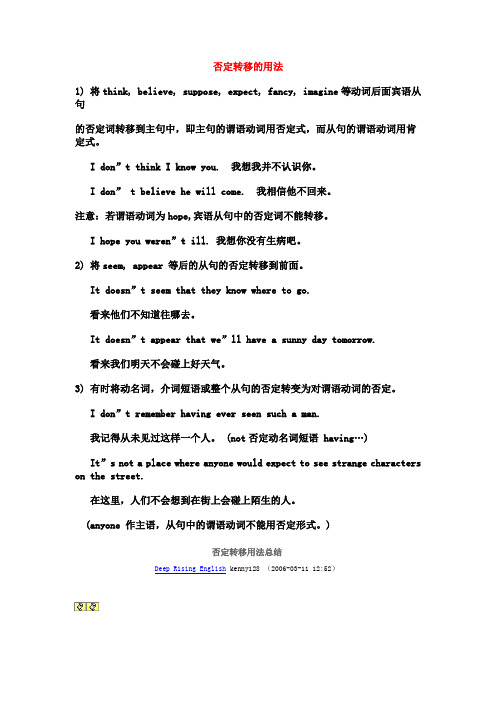
否定转移的用法1) 将think, believe, suppose, expect, fancy, imagine等动词后面宾语从句的否定词转移到主句中,即主句的谓语动词用否定式,而从句的谓语动词用肯定式。
I don”t think I know you. 我想我并不认识你。
I don” t believe he will come. 我相信他不回来。
注意:若谓语动词为hope,宾语从句中的否定词不能转移。
I hope you weren”t ill. 我想你没有生病吧。
2) 将seem, appear 等后的从句的否定转移到前面。
It doesn”t seem that they know where to go.看来他们不知道往哪去。
It doesn”t appear that we”ll have a sunny day tomorrow.看来我们明天不会碰上好天气。
3) 有时将动名词,介词短语或整个从句的否定转变为对谓语动词的否定。
I don”t remember having ever seen such a man.我记得从未见过这样一个人。
(not否定动名词短语 having…)It”s not a place where anyone would expect to see strange characters on the street.在这里,人们不会想到在街上会碰上陌生的人。
(anyone 作主语,从句中的谓语动词不能用否定形式。
)否定转移用法总结Deep Rising English kenny128 (2006-03-11 12:52)有感于课文中一句话的理解)山东高唐一中刘长友外研版的新课标英语课本第二册Module 1 “Zhou Kai(2)p2中有这样一句话:I think I don’t get these things because I take a lot of exercise and am very fit.不少有学有基础的学生,其中包括一些老师,对这一个句子中,该不该用否定转移的句子,展开了激烈讨论。
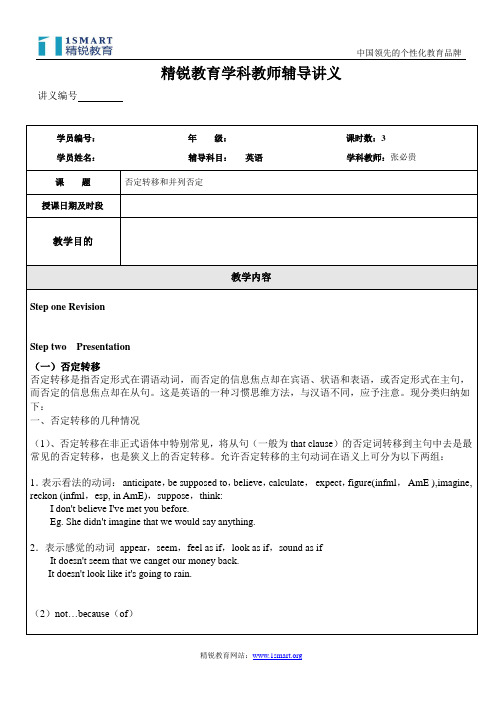

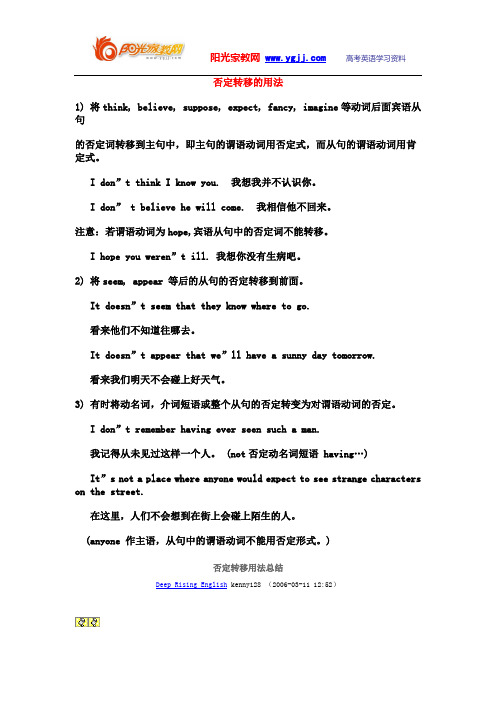
否定转移的用法1) 将think, believe, suppose, expect, fancy, imagine等动词后面宾语从句的否定词转移到主句中,即主句的谓语动词用否定式,而从句的谓语动词用肯定式。
I don”t think I know you. 我想我并不认识你。
I don” t believe he will come. 我相信他不回来。
注意:若谓语动词为hope,宾语从句中的否定词不能转移。
I hope you weren”t ill. 我想你没有生病吧。
2) 将seem, appear 等后的从句的否定转移到前面。
It doesn”t seem that they know where to go.看来他们不知道往哪去。
It doesn”t appear that we”ll have a sunny day tomorrow.看来我们明天不会碰上好天气。
3) 有时将动名词,介词短语或整个从句的否定转变为对谓语动词的否定。
I don”t remember having ever seen such a man.我记得从未见过这样一个人。
(not否定动名词短语 having…)It”s not a place where anyone would expect to see strange characters on the street.在这里,人们不会想到在街上会碰上陌生的人。
(anyone 作主语,从句中的谓语动词不能用否定形式。
)否定转移用法总结Deep Rising English kenny128 (2006-03-11 12:52)有感于课文中一句话的理解)山东高唐一中刘长友外研版的新课标英语课本第二册Module 1 “Zhou Kai(2)p2中有这样一句话:I think I don’t get these things because I take a lot of exercise and am very fit.不少有学有基础的学生,其中包括一些老师,对这一个句子中,该不该用否定转移的句子,展开了激烈讨论。

否定转移得用法1) 将think, believe, suppose, expect, fancy, imagine等动词后面宾语从句得否定词转移到主句中,即主句得谓语动词用否定式,而从句得谓语动词用肯定式、I don”t think I know you。
我想我并不认识您。
I don”t believe he will come。
我相信她不回来、注意:若谓语动词为hope,宾语从句中得否定词不能转移。
I hope you weren”t ill。
我想您没有生病吧。
2) 将seem, appear 等后得从句得否定转移到前面。
It doesn"tseem thatthey know where to go。
瞧来她们不知道往哪去。
It doesn”t appearthat we”ll have a sunny day tomorrow、瞧来我们明天不会碰上好天气。
3) 有时将动名词,介词短语或整个从句得否定转变为对谓语动词得否定。
I don”t remember having ever seen such a man。
我记得从未见过这样一个人。
(not否定动名词短语having…)It"s not a place where anyonewould expect to seestrange characterson the street。
在这里,人们不会想到在街上会碰上陌生得人。
(anyone 作主语,从句中得谓语动词不能用否定形式。
)否定转移用法总结Deep Rising Englishkenny128 (2006-03—1112:52)有感于课文中一句话得理解)山东高唐一中刘长友外研版得新课标英语课本第二册Module 1 “Zhou Kai(2)p2中有这样一句话:I think Idon’t get these things because I take a lot of exercise and am very fit、不少有学有基础得学生,其中包括一些老师,对这一个句子中,该不该用否定转移得句子,展开了激烈讨论。
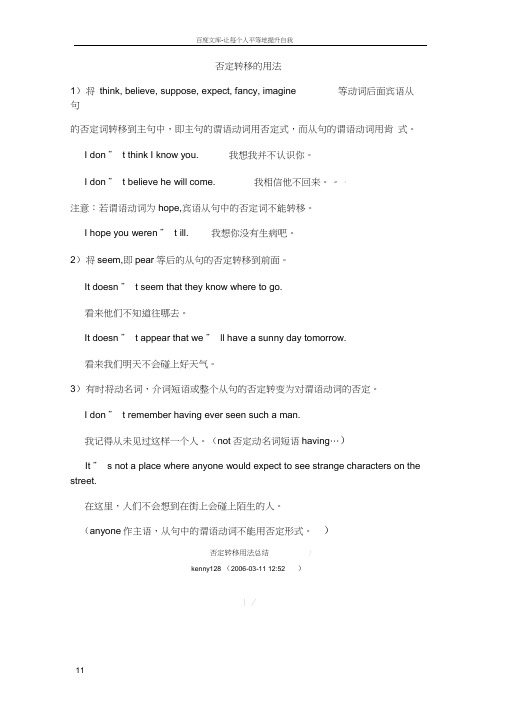
否定转移的用法1)将think, believe, suppose, expect, fancy, imagine 等动词后面宾语从句的否定词转移到主句中,即主句的谓语动词用否定式,而从句的谓语动词用肯式。
I don ” t think I know you. 我想我并不认识你。
I don ” t believe he will come. 我相信他不回来。
、注意:若谓语动词为hope,宾语从句中的否定词不能转移。
I hope you weren ” t ill. 我想你没有生病吧。
2)将seem,即pear等后的从句的否定转移到前面。
It doesn ” t seem that they know where to go.看来他们不知道往哪去。
It doesn ” t appear that we ” ll have a sunny day tomorrow.看来我们明天不会碰上好天气。
3)有时将动名词,介词短语或整个从句的否定转变为对谓语动词的否定。
I don ” t remember having ever seen such a man.我记得从未见过这样一个人。
(not否定动名词短语having…)It ” s not a place where anyone would expect to see strange characters on the street.在这里,人们不会想到在街上会碰上陌生的人。
(anyone作主语,从句中的谓语动词不能用否定形式。
)否定转移用法总结/kenny128 (2006-03-11 12:52 )\ /有感于课文中一句话的理解)山东高唐一中刘长友外研版的新课标英语课本第二册Module 1 “Zhou K ai (2) p2中有这样一句话:I think I don ' t get these things because I take a lot of exercise and am very fit.不少有学有基础的学生,其中包括一些老师,对这一个句子中,该不该用否定转移的句子,展开了激烈讨论。

否定前移的用法
1. 哎呀呀,你知道吗,有时候我们会说“我觉得你不应该这样做”,这其实就是否定前移啦!比如说,“我不认为他会来”,而不是“我认为他不会来”,这是不是很有意思呢?
2. 嘿,你想想看,“我不相信这不是真的”,这也是否定前移呢!就好像我们明明心里是肯定的,却偏要先否定一下再表达出来,神奇吧!就像我们说“我不觉得这不好吃”,奇怪吧?
3. 哇塞,你发现没呀,“我不盼望他不回来”,这就是典型的否定前移哟!是不是感觉有点绕,但又很特别呀!就像有时候我们会说“我不希望你不高兴”,这种表达很特别呢!
4. 啊啊啊,“我不觉得你不懂”,这可就是否定前移在起作用呀!明明是觉得你懂,却要这么绕一下说出来,是不是很有味道?就好像说“我不认为你做不到”,是不是挺有意思的?
5. 哎呀呀,“我不猜想她不会不同意”,哈哈,这就是否定前移呀!就跟我们有时候会说“我不觉得你不会喜欢”一样,这种表达方式让语言变得更丰富了呢!
6. 哟呵,“我不期望他不成功”,这也是否定前移呢!是不是感觉这种表达很独特呀!就像我们会说“我不认为这事不顺利”一样。
其实否定前移啊,就是让我们的表达更生动、更特别啦!
我的观点结论:否定前移真是一种有趣又特别的语言现象呢,让我们的表达更加多样和丰富!。

否定何时不前移 LELE was finally revised on the morning of December 16, 2020否定何时不前移根据语法的惯例,think, suppose, believe, imagine, guess 等后的宾语从句如果是否定句,要把否定转移到主句的think等动词上,这叫做“否定前移”或“否定前置”。
如:I think you can not go there by bus. (误)I don’t think you can go there by bus.(正)我认为你不能乘坐公共汽车去那儿。
在冀教版九年级课本第25课课文中,有这么一句话:“I tho ught you didn’t have any money.”该句是一个宾语从句,从句中的否定没有转移到主句中。
这是为什么呢是不是还有其他情况下否定不前移呢笔者经过翻阅若干本英语参考书及工具书,总结出以下情况下think 等词后的宾语从句的否定不能转移到主句think动词上。
① think 是完成时态或完成进行时态时;如:I have been thinking that we should not take his advice.我一直认为我们不应该听他的话。
② think 是一般过去时或过去进行时态时;如:We thought that this book was not worth reading.我们认为这本书值得一读。
③ think 前有副词修饰的时候;如:I almost think you are not my son’s teacher.我差点认为你不是我儿子的老师。
④ think 前有do, did 等词强调时;如:I do think that she is not pretty at all.我确实认为她不漂亮。
⑤ think 用于一般疑问句或特殊疑问句中;如:Do you think he will not join the Party?你认为他不会入党吗?Why do think we can’t beat you?你们怎么认为我们打不赢你们呢?⑥当think后的宾语从句中含有no, never, nothing, nobody等否定词时;如:I think she may have nothing to do today.我认为她今天没事干。
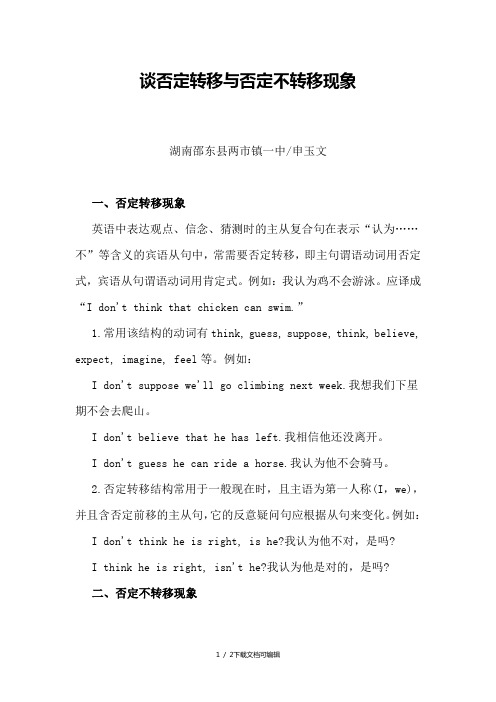
谈否定转移与否定不转移现象湖南邵东县两市镇一中/申玉文一、否定转移现象英语中表达观点、信念、猜测时的主从复合句在表示“认为……不”等含义的宾语从句中,常需要否定转移,即主句谓语动词用否定式,宾语从句谓语动词用肯定式。
例如:我认为鸡不会游泳。
应译成“I don't think that chicken can swim.”1.常用该结构的动词有think, guess, suppose, think, believe, expect, imagine, feel等。
例如:I don't suppose we'll go climbing next week.我想我们下星期不会去爬山。
I don't believe that he has left.我相信他还没离开。
I don't guess he can ride a horse.我认为他不会骑马。
2.否定转移结构常用于一般现在时,且主语为第一人称(I,we),并且含否定前移的主从句,它的反意疑问句应根据从句来变化。
例如:I don't think he is right, is he?我认为他不对,是吗?I think he is right, isn't he?我认为他是对的,是吗?二、否定不转移现象否定转移结构通常用于一般现在时,当主句中谓语动词为“一般过去时”或“过去进行时”、“过去进行时”、“现在完成时”等时态时,否定不转移。
其次,还有下面几种情况否定不转移。
1.当think用在疑问句中时。
例如:Why do you think I can't do it?你为什么认为我不会做它呢?Do you think my father won't agree?你认为我父亲不会同意吗?2.当主句的谓语动词与情态动词连用时。
例如:He must think I can not fit for the job.他一定认为我不适合这项工作。

否定转移的用法 Modified by JACK on the afternoon of December 26, 2020否定转移的用法1) 将think, believe, suppose, expect, fancy, imagine等动词后面宾语从句的否定词转移到主句中,即主句的谓语动词用否定式,而从句的谓语动词用肯定式。
I don”t think I know you. 我想我并不认识你。
I don” t believe he will come. 我相信他不回来。
注意:若谓语动词为hope,宾语从句中的否定词不能转移。
I hope you weren”t ill. 我想你没有生病吧。
2) 将seem, appear 等后的从句的否定转移到前面。
It doesn”t seem that they know where to go.看来他们不知道往哪去。
It doesn”t appear that we”ll have a sunny day tomorrow.看来我们明天不会碰上好天气。
3) 有时将动名词,介词短语或整个从句的否定转变为对谓语动词的否定。
I don”t remember having ever seen such a man.我记得从未见过这样一个人。
(not否定动名词短语 having…)It”s not a place where anyone would expect to see strange characters on the street.在这里,人们不会想到在街上会碰上陌生的人。
(anyone 作主语,从句中的谓语动词不能用否定形式。
)否定转移用法总结kenny128 (2006-03-11 12:52)有感于课文中一句话的理解)山东高唐一中刘长友外研版的新课标英语课本第二册Module 1 “Zhou Kai(2)p2中有这样一句话:I think I don’t get these things because I take a lot of exercise and am very fit.不少有学有基础的学生,其中包括一些老师,对这一个句子中,该不该用否定转移的句子,展开了激烈讨论。


think后的宾语从句否定不转移的六种情况think等动词在使用时的否定转移是英语中很特殊的语法现象。
也就是,根据英语习惯用法,think后的宾语从句若是否定句,则需要将否定转至主句的think上。
例如:将“我认为他不对。
” 习惯上译为:I don't think he is right.而I think he is not right.往往被看成不符合英语语法的表达习惯,是错误的。
但在下列情况下,think后面的宾语从句的否定不可进行否定转移。
一、think 是如下的两种时态【完成、过去(进行)】时,宾语从句的否定不可进行转移。
1. think是完成时态或完成进行时态时。
例如:I have been thinking we should not have anything to do with a person like him.我一直在想,我们不应当与像他那样的人有任何往来。
2. think 是一般过去时态或过去进行时态时。
例如:I thought we should not do like that.我觉得我们不应该那样做。
二、think 之前有下列两类词修饰时,宾语从句的否定不发生转移。
1. think 之前有强调词do。
例如:I do think it is not wise of him to do so我确实认为他这么做是不明智的。
2. think 之前有副词修饰时。
例如:I really think Lucy caH t finish her homework within two hours.我真的认为露西两小时内不能完成家庭作业。
三、think 用于下列两种句式中时,宾语从句否定不转移。
1. 当think用于疑问句中1时。
例如:Do you think he will not come?你认为他不会来吗?Why do you think I caH t be fit for the job?你为何认为我不适合那项工作?2. 当think用作插入语时。
否定何时不前移
根据语法的惯例,think, suppose, believe, imagine, guess 等后的宾语从句如果是否定句,要把否定转移到主句的think等动词上,这叫做“否定前移”或“否定前置”。
如:I think you can not go there by bus. (误)
I don’t think you can go there by bus.(正)
我认为你不能乘坐公共汽车去那儿。
在冀教版九年级课本第25课课文中,有这么一句话:“I thought you didn’t have any money.”该句是一个宾语从句,从句中的否定没有转移到主句中。
这是为什么呢?是不是还有其他情况下否定不前移呢?笔者经过翻阅若干本英语参考书及工具书,总结出以下情况下think 等词后的宾语从句的否定不能转移到主句think动词上。
① think 是完成时态或完成进行时态时;
如:I have been thinking that we should not take his advice.
我一直认为我们不应该听他的话。
② think 是一般过去时或过去进行时态时;
如:We thought that this book was not worth reading.
我们认为这本书值得一读。
③ think 前有副词修饰的时候;
如:I almost think you are not my son’s teacher.
我差点认为你不是我儿子的老师。
④ think 前有do, did 等词强调时;
如:I do think that she is not pretty at all.
我确实认为她不漂亮。
⑤ think 用于一般疑问句或特殊疑问句中;
如:Do you think he will not join the Party?
你认为他不会入党吗?
Why do think we can’t beat you?
你们怎么认为我们打不赢你们呢?
⑥当think后的宾语从句中含有no, never, nothing, nobody等否定词时;
如:I think she may have nothing to do today.
我认为她今天没事干。
⑦当 think 用作插入语时;
如:Your sister ,I think, is not a friendly gay.
我认为你妹妹不太友好。
⑧当think后的宾语从句中含有not at all, not a little, not enough, can’t help doing 等固定词组时;如:I think you can’t help laughing when you hear the joke.
我认为你听到这个笑话时会忍不住笑的。
⑨当think和另一个动词构成并列谓语时;
如:I think and hope you won’t feel sad even if you lose the mat ch.
我们认为也希望,即使您们输掉了比赛,你们也不会伤心的。
⑩当think用作虚拟语气的谓语had thought, 表示“本来认为……”时;
如:I had thought that he hadn’t come here.
我本来认为他不来了呢。
(注:文档可能无法思考全面,请浏览后下载,供参考。
可复制、编制,期待你的好评与关注!)。